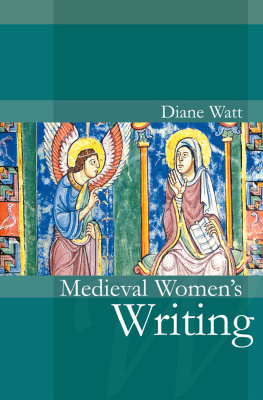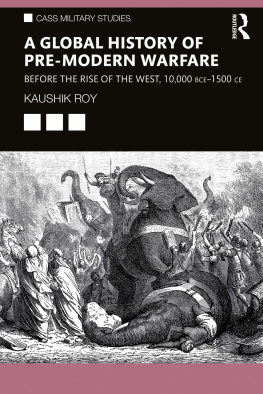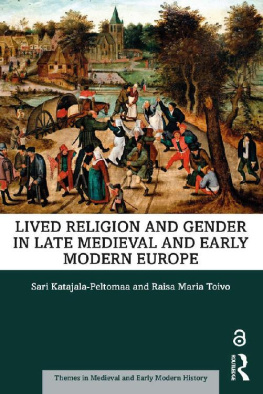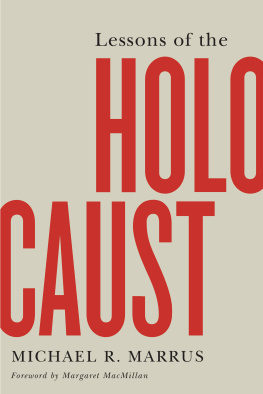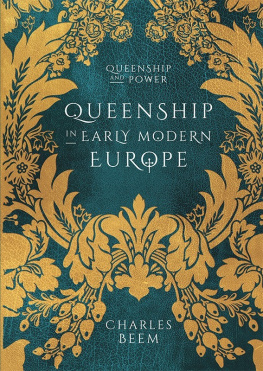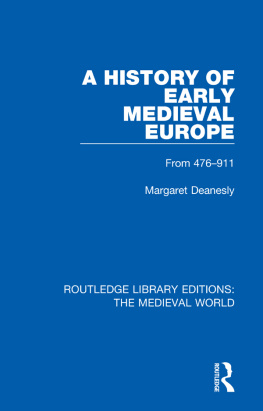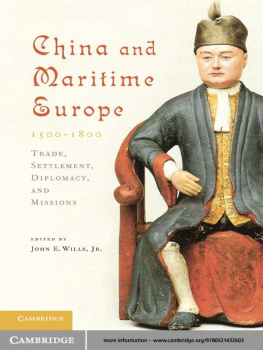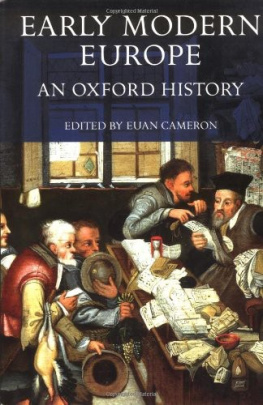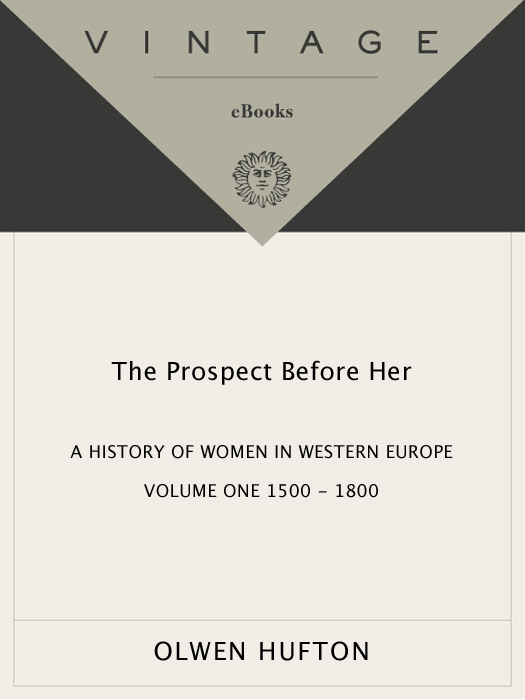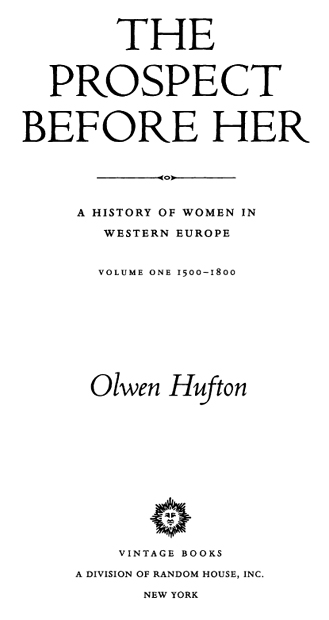ALSO BYOlwen Hufton
Bayeux in the Late Eighteenth Century (Oxford, 1967)
The Poor of Eighteenth-Century France (Oxford, 1974)
Winner of the Wolfson Prize
Europe: Privilege and Protest 173089 (London, 1981)
Women and the Limits of Citizenship in the French Revolution
(Toronto, 1991)
Historical Change and Human Rights (ed.)
(Oxford Amnesty Lectures, 1994)
Olwen Hufton
THE PROSPECT BEFORE HER
Olwen Hufton is Professor of History at the European University Institute in Florence. She was the architect and first head of the Womens Studies Program at Harvard, where she was also the William Kenan Jr. Chair of European History and Womens History, and Senior Research Fellow at the Minda de Gunzburg Center for European Studies. She divides her time between Florence and her home outside London.
FIRST VINTAGE BOOKS EDITION, MARCH 1998
Copyright 1995 by Olwen Hufton
All rights reserved under International and Pan-American Copyright
Conventions. Published in the United States by Vintage Books, a division
of Random House, Inc., New York. Originally published in hardcover
in Great Britain by HarperCollins Publishers Ltd., London, in 1995,
and subsequently in hardcover in the United States
by Alfred A. Knopf, Inc., New York, in 1996.
The Library of Congress has cataloged the Knopf edition as follows:
Hufton, Olwen H.
The prospect before her : a history of women in western
Europe / Olwen Hufton.1st American ed.
v. <1 >cm.
Originally published: London : HarperCollins. 1995.
Includes bibliographical references.
Contents: v. 1. 15001800
1. WomenEurope. WesternHistory.
2. WomenEurope. WesternSocial conditions. I. Title.
HQ1587.H84 1996 305.4094dc21 96-39158
eISBN: 978-0-307-79194-8
Random House Web address: www.randomhouse.com
v3.1
For Caroline and Clare Eliza
CONTENTS
ACKNOWLEDGEMENTS
There are nine and sixty ways of constructing tribal lays
Andeverysingleoneofthemisright!
RUDYARD KIPLING, IN THE NEOLITHIC AGE
A NYONE rash enough to embark on an enterprise of this extent realizes as the effort draws to a close that almost every single one of her friends who are scholars in the field might have done the same thing somewhat differently. There might have been a little more about sexuality, more about power, more gender theory, more big names, if someone else had been the writer. So be it. I have spent my professional life researching, writing and teaching about comparative European social history and working in records concerned with survival under adverse circumstances, with poverty, the relationships beween rich and poor, the dynamics of communities and crime, so that this history of women draws in the first place upon this intellectual baggage. It also, however, owes a huge amount to friends whose work has so enriched and extended an understanding of the many issues involved.
My first thanks are due to Patricia McNulty, in whose company I first taught about some of the issues appearing here in the dim and distant sixties and who read most of this script. Then comes Lyndal Roper, whom I so much admire and who drew my attention to lacunae and possibilities. Natalie Zemon Davis, Joan Scott and Louise Tilly first invited me to talk about some of these themes in America in 1974, when we were all new in the field of womens history, and their friendship has meant much to me. Angus MacKay and David Higgs were unsparing in providing me with information in areas where I was ignorant. My neighbour and fellow worker in the field Carolyn Williams was always prepared to respond to my more abstruse questions, and I never ceased to be dazzled by her knowledge. In the course of writing this book a lot of new friends were made. First the Dutch group, Lotte van de Pol, Rudolph Dekker and Florence Koorn, and Herman Roodenberg, who have been immensely generous in sharing their work and passing on to me developments in the Netherlands. Then those made (or, in the case of Simon Schama, perpetuated) in the context of Harvard: Caroline Ford, Alex Owen, and a host of brilliant students, some of whom were part of my writing-gender-history group and will find in this book ideas we shared. I would pick out Deborah Cohen, Cara Robertson, Paul Franklin and Michelle Jaffe, all of whom added in some way to this book, and Julie Pavlon, who presided over my life and was very special.
This book, however, was to be finally written in Italy, while I was teaching at the European University Institute in Florence. This particular experience has been enriching in many ways. First I would like to thank the historians of the wider Florentine community, Sara Matthews Grieco, Gabriella Zarri and Giulia Calvi and the members of the Pentofillo group, who not only welcomed me into their midst but introduced me to developments in Italian womens history, which has for me a stunning freshness and originality of direction. Secondly, valued colleagues helped, particularly John Brewer and Grard Delille. Thirdly, I have encountered a new generation of European students in an institution which is providing a learning process for the faculty as well as the students. Of the early modernists, Silvia Evangelisti, Concepcin Torres and Elisa Sampson should know that they made a fundamental impression on my knowledge of the function of religious orders. The memory of Agnes Hochberg, whose untimely death left us all diminished, will remain forever green. My thanks must also go to Kathy Fabiani, who spent more hours over the Xerox machine than she probably cares to remember.
Finally, every book is a personal odyssey. This one was coincident with a death, that of my mother, the thorny path through adolescence of two beloved childrenwho were able by the end to make some contributions to this scriptand aspects of the human condition which beset middle life. Brian Murphy and Beryl Williams were valued supports on both the personal and the intellectual level. New and esteemed friendsRuth Harris and Iain Pears, Yota Kravaritou, Verena Stlke, Barbara MacLennan and Ruth Whiting of Bedales School, to whom I owe a great dealenriched my life during the writing years. There was also birth. Olwen Dekker may have to go through life explaining her name, but her arrival in the summer of 1993 was very timely. It made me ponder further on continuities and changes and what remains in the lives of women of the world we are supposed to have lost. In addition, the event determined the title of this volume.
OLWEN HUFTON
SETTIGNANO, FLORENCE, FEBRUARY 1995
INTRODUCTION
The Limits of the Possible and Questions of Change
I read it [history] a little as a duty; but it tells me nothing that does not either vex or weary me. The quarrels of popes and kings, with wars and pestilences in every page; the men all so good for nothing, and hardly any women at all, it is very tiresome; and yet I often think it odd that it should be so dull, for a great deal of it must be invention.


